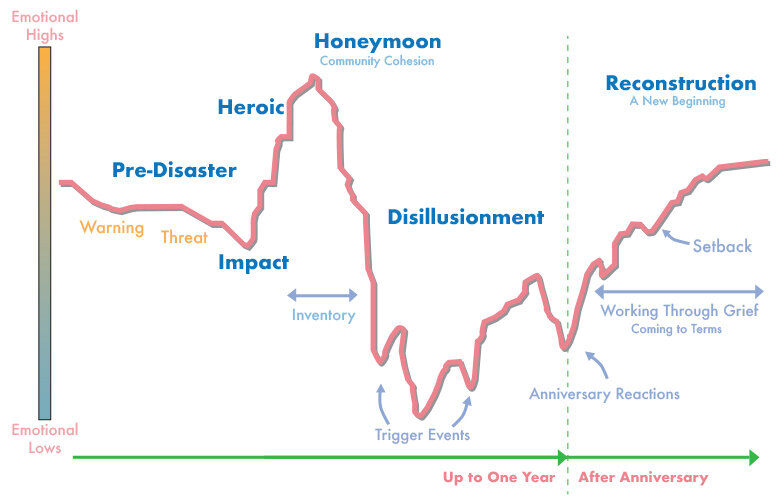How can we ensure tourism’s recovery benefits those that most need it?
In recent weeks several stories have emerged of tourism initiatives set up to offer free holidays to medics and other health workers once people are allowed to travel and visit hotels again. These range from #treatourNHS to the launch of the Give Them a Break website.
These campaigns are all inspiring on their own terms, and give me hope that the recovery can be marked by the same generosity and resilience that has been shown through the early stages of the lockdown. This will be increasingly necessary, as maintaining community cohesion and a sense of optimism may become more challenging in the weeks and months ahead.
The above graph was shared on Twitter a few days ago by Alex Evans, senior fellow at New York University’s Center on International Cooperation. It’s from the Training Manual for Mental Health and Human Service Workers in Major Disasters, by Deborah J. DeWolfe (available for free as an ebook). “There are well identified stages of how people feel and act after a huge shock,” says Evans. “We’ve been at the ‘honeymoon’ stage, where lots of us feel a sense of agency and community cohesion – but things will get tougher as we move into the ‘disillusionment’ stage.”
As countries edge closer towards different sorts of recoveries, we need to work as an industry to ensure that we continue to support solidarity through any ‘disillusionment stage’ we may encounter. Over the last week or two I have read countless expert predictions on which sectors will come out the other side in the best state. With a couple of notable exceptions, almost every spokesperson sees their sector as being the one that flourishes. They can’t all be right, and it suggests there is a remarkable amount of confirmation bias at work.
How we communicate matters in these fraught times. Because much as we all want this to be nearing the end, this is the beginning of the story. And while our first chapter has been one of solidarity, the next ones are still to be written. “In moments of change new worlds come into being,” says the Pandemic Response resource guide from the UK’s Public Interest Research Centre, which works with civil society to develop stories and strategies for a more equal, green and democratic society. “The way this crisis is being talked about today will shape the world we emerge into.”
Other crisis communication resources back this up. “In addition to acting with compassion and urgency around immediate needs, we must address the insidious rhetoric that will undermine our long-term shared goals,” explains this COVID-19 messaging guide published by the Million Voters Project. “In a moment of crisis – especially one centered around easily transmitted infection – the messages we must disrupt are rooted in xenophobia, racism, and individualism. More than ever people will be susceptible to fearing ‘the other’ and without a counter-vision and narrative, dominant media and certain public figures will actively or inadvertently stoke that fear.”
No one in the industry wants tourism to end up associated with xenophobia, racism or individualism. And if you think it couldn’t happen, think of the ‘Refugees Welcome, Tourists Go home’ graffiti that became one of the most recurring memes associated with overtourism. Or think of Flight Shame.
Acts of altruism and support for host communities must continue to be our defining characteristics in the months to come. Otherwise we will lose control of the narrative, and stories like the tourists who chartered a private jet to escape down to a luxury villa in the south of France, or rural communities being ‘overrun by second home owners’ risk dominating how the industry is perceived.
It matters therefore that recovery initiatives like those gifting holidays to medics are such generous expressions of solidarity. In connecting hospitals and hospitality, they emphasise the vital deeper truth that the real benefit of tourism is that it is restorative. They remind that there is something intrinsically good about the emotional and mental wellbeing that travel and leisure delivers to those who need it most.
Can we go further?
At the beginning of this week I read an article by the French sustainable tourism expert Guillaume Cromer that takes this concept further. Referring to the news that the southern French region of Provence-Alpes-Côte-d’azur has voted to inject 2.6 million euros to finance the restart of tourism in the region, Cromer asked: “Instead of putting money back into the machine like we used to, couldn’t we… support citizens who are struggling to go on holidays”?
Quite rightly, everyone now wants to thank hard working nurses and doctors. Cromer’s observation challenges us to explore how far we are willing to extend this altruism. Supermarket Staff? Bus drivers? Amazon workers?
What about the long term unemployed? Victims of abuse? The severely disabled? What about those for whom confinement is a permanent state of being?
If we believe that holidays offer a social good that can help people who are broken and exhausted, then surely that remains true always. If so, then the approaches and attitudes embodied in the holidays for helpers initiatives should play a part in defining the tourism that comes next.
This is an extract from an article first published on the World Travel Market website.

